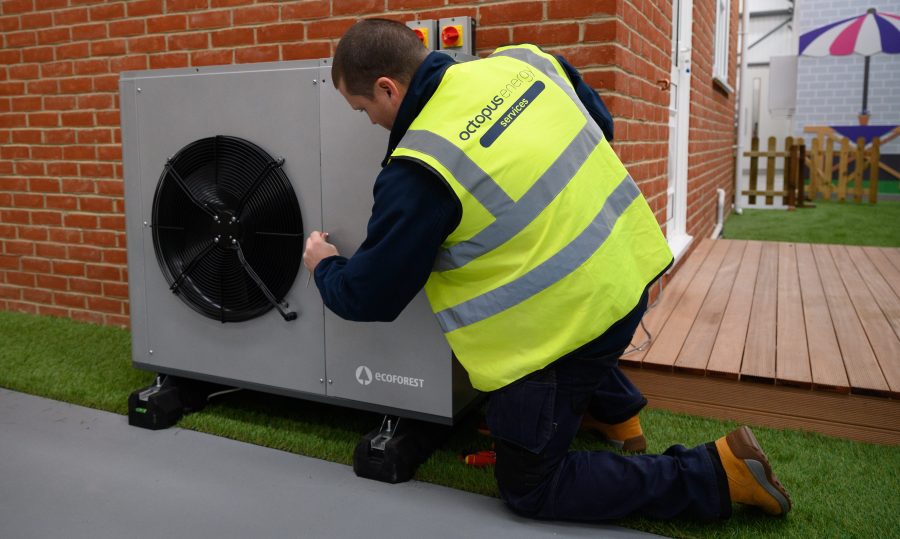Biden’s new climate law could help more homeowners install heat pumps

On Tuesday, President Joe Biden signed the Inflation Reduction Act into law.
Among other things, it allocates about $370 billion for climate-friendly technology and programs, including tax rebates and credits to incentivize Americans to replace their old air conditioners or furnaces with heat pumps.
These machines can be used for both cooling and heating homes, and they’re more energy-efficient than traditional systems.
But making the switch can be costly for households.
Alexander Gard-Murray is a postdoctoral fellow at Brown University’s Climate Solutions Lab. He said the law could help families who get stuck when their furnace dies out. The following is an edited transcript of his conversation with Kimberly Adams.
Alexander Gard-Murray: When that happens, people are usually limited by whatever is in stock in their local area and whatever their contractors know and are familiar with. So, it takes time to make sure there’s heat pumps at every warehouse, and all the contractors are familiar, and finally, there’s cost. Upfront, a heat pump costs a bit more than a comparable air conditioner. And that’s where government support is really important.

Kimberly Adams: Speaking of government support, what does the Inflation Reduction Act do in regard to heat pumps in particular?
Gard-Murray: The Inflation Reduction Act includes three big things to speed up heat pump adoption: tax credits for everybody, rebates for low- and middle-income families and spending on American manufacturing. There’s a new high-efficiency electric home rebate program. Families making less than 150% of their area’s median income are eligible. And if you make less than 80% of your area’s median income, you get even bigger rebates up to $8,000. So these tax credits and rebates, once they’re all online, are probably gonna have a huge effect on the market.
Adams: So we’re actually talking about dollars and cents. How much money could switching over to a heat pump actually save people?
Gard-Murray: The energy-efficiency nonprofit CLASP projects that a family switching from just using gas will save an average of $75 a year, from oil about $400. And from propane or electric resistance more than $500 a year. Now, the savings are going to depend on the specifics of where you live, how well-sealed your home is. But, in general, we’d expect to see pretty good savings around the country.
Adams: Even though these are more sort of “eco-friendly,” they still do rely on electricity. So how much benefit environmentally do we really get from just using a different type of heating and cooling?
Gard-Murray: This is one of those rare cases where for most people, it’s going to be better both financially and environmentally. There was a great study by the energy-efficiency nonprofit CLASP that found if all the houses in the U.S. that currently use some kind of other traditional heating system switched over, the U.S. would cut annual emissions by 67 million tons of carbon dioxide each year. That’s basically like taking 14 million cars off the road. And at the same time, if that happened, national heating costs would go down by $13.6 billion each year. Now, that’s not gonna happen instantly. We’re not going to get everybody to switch over in the next year. But the magnitude of both savings and environmental benefits is really quite huge.
Adams: So I suppose swapping out your system for a heat pump has some longer-term consequences as well.
Gard-Murray: Definitely. The benefits to switching over to heat pumps accumulate over time. So any bill savings that you get in a year, you’re obviously going to keep getting each year. But the environmental benefits are also probably going to get bigger over time. And that’s because the electricity grid is getting greener over time.
Adams: So just to be clear on this, so say I have a house in the Northeast that I’m still heating with heating oil, and I switch over to a heat pump. I’m now getting electricity off the grid to heat and cool my home. And if that grid is run from a coal-fired power plant, it may be a wash, but once that grid switches over to maybe solar or wind energy, not only is my own household’s heating and cooling more efficient, but it’s doubly green because of what the grid is doing.
Gard-Murray: Exactly. Heat pumps allow families to hitch a ride on the decarbonization of the grid. So the cleaner the grid gets, the cleaner the electricity for your home heating gets.
Related links: More insight from Kimberly Adams
You can study up on heat pumps by checking out the CLASP report Gard-Murray mentioned, which he collaborated on. Researchers found that in order to get those ideal cuts to carbon emissions, it’s going to take a whole lot of heat pump installations, about 45 million households over a period of 10 years.
And CNBC has an article breaking down some of the other incentives in the Inflation Reduction Act to green your home, including benefits for solar panel installation.
Vox also had a helpful video all about heat pump technology and the demand for it.
Vox notes that around one-third of the world’s population needs both heating and cooling throughout the year. But that’s likely to increase as the global climate continues to heat up.
We’ll have more about that on Thursday’s episode of the show.
The future of this podcast starts with you.
Every day, the “Marketplace Tech” team demystifies the digital economy with stories that explore more than just Big Tech. We’re committed to covering topics that matter to you and the world around us, diving deep into how technology intersects with climate change, inequity, and disinformation.
As part of a nonprofit newsroom, we’re counting on listeners like you to keep this public service paywall-free and available to all.
Support “Marketplace Tech” in any amount today and become a partner in our mission.











